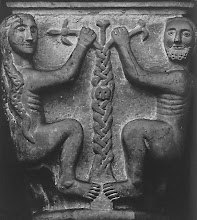p. 140
Almost as good as her passion, I’ll think, almost as good as her presence,
her physical grace,
almost as good as making love with her, I’ll think in my last aching
breath before last,
my glimpse before last of the light, were her good will and good wit,
the steadiness of her affections.
Almost, I’ll think, sliding away on my sleigh of departure, the rind of
my consciousness thinning,
the fear of losing myself, of—worse—losing her, subsiding as I think,
hope it must,
almost as good as her beauty, her glow, was the music of her thought,
her voice and laughter.
Almost as good as kissing her, being kissed back, I hope I’ll have the strength
still to think
was watching her as she worked or read, was beholding her selfless
sympathy for son, friend, sister,
even was feeling her anger, sometimes, rarely, lift against me, then be
forgotten, put aside.
Almost, I’ll think, as good as our unlikely coming together, was our
constant, mostly unspoken debate
as to whether good in the world was good in itself, or (my side) only
the absence of evil:
no need to say how much how we lived was shaped by her bright spirit,
her humor and hope.
Almost as good as living at all—improbable gift—was watching her once
cross our room,
the reflections of night rain she’d risen to close the window against
flaring across her,
doubling her light, then feeling her come back to bed, reaching to find
and embrace me,
as I’ll hope she’ll be there to embrace me as I sail away on that last
voyage out of myself,
that last, sorrowful passage out of her presence, though her presence,
I’ll think, will endure,
as firmly as ever, as good even now, I’ll think in that lull before last,
almost as ever.
Another wonderful C.K. Williams poem. I’m going to have to check out a book of his poetry and read him more fully. I love it that he never says that all those “deeper” and more spiritual qualities are better than the physical love between them. First of all, I think I believe him more when he says “almost as good.” Secondly, how wonderful to be cherished as a desirable woman and treasured as a good person. The repetition of “almost as good as” seems to erase the comparison though between spirit and body, and by the end, seems to erase the line between life and death. If it’s almost as good as—and what he describes is so beautifully good— maybe, really, it is as good. I think the last lines are especially graceful. Reading it out loud to my husband I realize that this poem almost needs to be read silently and with full attention. I like the pictures made by “sliding away on my sleigh of departure” and “the rind of my consciousness thinning.” I like the little vignette he shares about her getting up to close the window, approaching her own reflection in the glass, and coming back to bed “reaching to find and embrace me”—I get the feeling that’s what he’s most grateful for—her reaching to find and embrace him over and over in all the things she was and did. I can’t but believe with him that “her presence will endure as firmly as ever.”
skip to main |
skip to sidebar


All text (excluding quoted poems and comments) within Matter | Pattern by Emma J is licensed under a Creative Commons Attribution-Noncommercial-Share Alike 3.0 United States License.
living with poetry
"Let our words be as necessary and useful as once were words of magic.
This is an unachievable ideal."
Anna Swir (1909 - 1984)
This is an unachievable ideal."
Anna Swir (1909 - 1984)
. . . . and elsewhere
Matter | Pattern

matter [ME matere, fr. OF matere, matiere, fr. L materia] tree trunk (<"matrix," the tree's source of growth) matter, subject, physical substance, wood for building, fr. mater mother
mother Based ultimately on the baby-talk form ma- 2 [Indo-European ma - 1 <"good" with derivatives meaning "occurring at a good moment, timely, seasonable, early, ripe" ; ma- 2 <"breast" an imitative root derived from the child's cry for the breast, a linguistic near-universal found in many of the world's languages; ma- 3 <"damp ") [ME moder, fr. OE modor, akin to OHG muoter, ON mothir, L mater (maternal, maternity, matriculate, matrix, matron), Gk meter (metro-, metropolis [<"mother city]; Demeter [< "god-mother"], Skt matr]
meter [ME meter, metre, fr. OE & MF, fr. L metrum, fr. Gk metron (<"measure" ) fr. IE root me-] meter, metrical, diameter, geometry, metronome. Suffixed forms mens, men-ot (<"moon, month") an ancient and universal unit of time measured by the moon (menarche, meniscus, menopause, menses, menstrual, bimester, semester, trimester).
poetry [fr. ME poet, poete fr. OF poete, fr. L poeta, fr. Gk poietes, poetes <"maker, composer, poet, fr. poien to make, do , create, compose"] akin to Skt cinoti <"he gathers, heaps up, piles in order," OSlav ciniti <"to arrange, to pile up"
padre from papa, a child's word for "father," a linguistic near-universal found in many languages. [IE root pa- <"to protect, feed" (fodder, forage, pabulum, food, foster, pasture, repast, pastor <"shepherd, protector") (ME fader, fr. OE faeder; akin to OHG fater, ON fathir, Goth fadar, L pater, Jupiter [<"god-father"], patrare [<"to bring about"]; Gk pater, Skt pitr) patrician, patrimony, patron, pater, paternal
pattern [ME patron, fr. MF, fr. L patronus (<"master, pattern") fr. L defender, protector, advocate, fr. patr-, pater (<"father") a fully realized form, original, or model accepted or proposed for imitation, archetype, exemplar.
mother Based ultimately on the baby-talk form ma- 2 [Indo-European ma - 1 <"good" with derivatives meaning "occurring at a good moment, timely, seasonable, early, ripe" ; ma- 2 <"breast" an imitative root derived from the child's cry for the breast, a linguistic near-universal found in many of the world's languages; ma- 3 <"damp ") [ME moder, fr. OE modor, akin to OHG muoter, ON mothir, L mater (maternal, maternity, matriculate, matrix, matron), Gk meter (metro-, metropolis [<"mother city]; Demeter [< "god-mother"], Skt matr]
meter [ME meter, metre, fr. OE & MF, fr. L metrum, fr. Gk metron (<"measure" ) fr. IE root me-] meter, metrical, diameter, geometry, metronome. Suffixed forms mens, men-ot (<"moon, month") an ancient and universal unit of time measured by the moon (menarche, meniscus, menopause, menses, menstrual, bimester, semester, trimester).
poetry [fr. ME poet, poete fr. OF poete, fr. L poeta, fr. Gk poietes, poetes <"maker, composer, poet, fr. poien to make, do , create, compose"] akin to Skt cinoti <"he gathers, heaps up, piles in order," OSlav ciniti <"to arrange, to pile up"
padre from papa, a child's word for "father," a linguistic near-universal found in many languages. [IE root pa- <"to protect, feed" (fodder, forage, pabulum, food, foster, pasture, repast, pastor <"shepherd, protector") (ME fader, fr. OE faeder; akin to OHG fater, ON fathir, Goth fadar, L pater, Jupiter [<"god-father"], patrare [<"to bring about"]; Gk pater, Skt pitr) patrician, patrimony, patron, pater, paternal
pattern [ME patron, fr. MF, fr. L patronus (<"master, pattern") fr. L defender, protector, advocate, fr. patr-, pater (<"father") a fully realized form, original, or model accepted or proposed for imitation, archetype, exemplar.
I am
All text (excluding quoted poems and comments) within Matter | Pattern by Emma J is licensed under a Creative Commons Attribution-Noncommercial-Share Alike 3.0 United States License.

